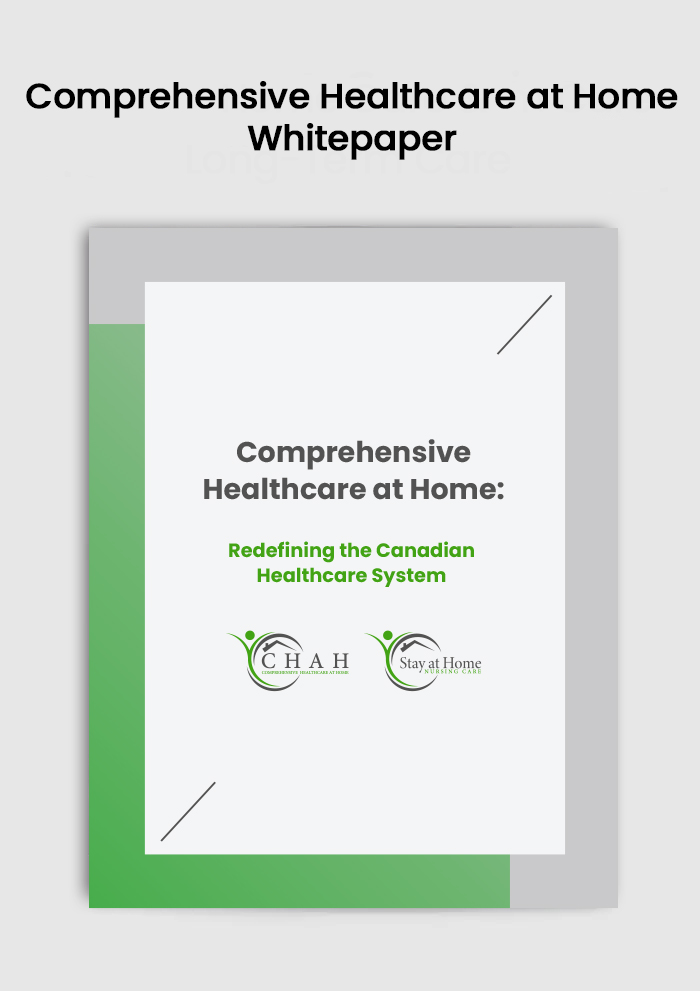We all face the inevitable cycle of life. But within this, for ourselves, for our loved ones, we need to make informed decisions around our lifestyle and quality of life.
How and where we age gracefully is a major decision. Recovery and support following a medical issue is a hurdle that most of us will face at some point. Either ourselves, our spouse, or our family members may face a chronic condition, especially in our later years.
Our home is perhaps the most obvious and natural environment to deal with these challenges, but awareness around Home Care options is often not fully understood. And this is frequently in the context of comparisons and trying to also understand Long-Term Care as an alternative service and choice.
Let’s explore these options and understand how they may fit into our own personal situation:
What is Home Care?
Home Care, or what we like to call Comprehensive Healthcare at Home, enables a range of services to individuals in their own homes to support daily living or specific healthcare needs. It is highly personalized care and services that allows individuals to maintain their independence and familiarity while remaining in their home environment.
A Personal Support Worker (PSW), or a Registered Nurse visits with the client on a scheduled set of visits, but also enables urgent response and support if needed. This assistance around daily living or medical care should be centred and evolve around a Personalized Care Plan.
Typical Services include:
Personal Care and Assistance
- Assisting with daily routines and providing personal hygiene assistance
- Light housekeeping; cleaning up; linen changing; laundry
- Maintaining a clean and safe environment
Companionship and Recreation
- Helps clients do what they love as well as deal with loneliness and stress
- Outings and social events, such as getting out to community centers
- Exercise – walks, fresh air
- Helping to connect to family – near and far (can help set up video calls, or accompany clients to events)
Meal Prep and Diet Planning
- Meal and grocery planning with the client
- Pick up groceries, or if the client is able, go with them to the store
- Meal preparation and cooking
- Snack preparation or easy to re-heat meals for days without caregivers
Dementia / Alzheimer’s Care
- Dementia-Care certified caregivers are matched to clients
- Day-to-day management of dementia using the Gentle Persuasive Approach (GPA)
- Medication support and adherence
- Organizing transportation
- Medical appointments
The familiar home environment can provide a sense of security, independence, and emotional well-being for individuals receiving care, and is especially impactful for individuals dealing with dementia / Alzheimer’s. Being in a familiar environment can significantly slow the progression of such ailments.
Home Care as an option is thus the opportunity to receive the necessary care and support while remaining in a familiar and comfortable environment. Family Members can choose to remain involved in the care process while maintaining a close connection with the individual receiving care.
This personalized nature of Home Care allows for a tailored approach that can adapt to changing needs and preferences over time.
It’s important to consider these unique circumstances and requirements of each individual when making decisions about Home Care versus other care options.
What is Long-Term Care?
Unlike Home Care, which primarily focuses on providing care in a person’s home, Long-Term Care takes place in specialized facilities such as nursing homes, assisted living facilities, or residential care homes.
Long-Term Care is suitable for individuals who have chronic illnesses, disabilities, or conditions that limit their ability to perform essential tasks independently. It provides 24/7 assistance with activities such as bathing, dressing, eating, medication management, and mobility support. The goal of Long-Term Care is to improve the quality of life and ensure the safety and wellbeing of individuals who require ongoing care.
Beyond daily living activities, Long-Term Care also includes:
- Medical supervision and support
- Built-in rehabilitation facilities
- Memory care for individuals with severe dementia or Alzheimer’s disease
- 24-hour skilled nursing care
- Additional social interaction due to other residents of the facility
- Access to specialized medical equipment
- Hospice care for end-of-life support
In addition to the individual’s condition, the home environment may not be conducive to providing the level of care required. Factors such as limited space, lack of accessibility modifications, or safety concerns can pose challenges for both the individual and the caregiver and may point to the Long-Term Care option.
Long-Term Care is thus an important consideration and transition from living independently, to a new phase in life.
We understand that these are big decisions to make and consider the following to help shape your thinking.
Factors to Consider
Level of Care Needed
The level of care needed is critical to consider when choosing between Home Care and Long-Term Care. Evaluating the individual’s medical condition, functional abilities, and daily living requirements can help determine the appropriate level of care.
Home Care is suitable for individuals who require assistance with daily living activities but can still live independently with some support. This may include help with bathing, dressing, medication management, meal preparation, and light housekeeping. Home Care provides personalized care in the comfort of one’s own home, allowing for greater independence and familiarity.
Long-Term Care alternatively, is more suitable for individuals with complex medical conditions or significant limitations in their ability to perform daily tasks. Long-Term Care facilities, such as nursing homes or assisted living communities, offer 24/7 professional care, including medical supervision, specialized health services, and assistance with all aspects of daily living.
Cost Considerations
Cost is another crucial factor to consider when evaluating home care versus long term care. The expenses associated with each option can vary significantly.
Home Care costs are based on an hourly rate, and total cost depends on the number of hours of care required each week. Factors that can influence the cost include the level of care needed, the location, and combination of PSW and Registered Nurse hours. It’s important to thoroughly research and compare the costs of home care services in your area.
On the other hand, Long-Term Care costs are usually higher than Home Care due to the facilities’ overhead costs associated with maintaining a care facility (both infrastructure but also permanent staff). Long-Term Care costs can vary based on the type of facility, location, level of care required, and additional services provided. Some individuals may opt for Long-Term Care insurance to help cover these expenses.
Typically, a Long-Term Care monthly fee will be in the CDN $ 5,000 to 8,000 range. Home Care can range from a few hundred dollars a month to several thousand, but the average for most clients is about $2,500/month. Both may be eligible to be funded in whole or part by your provincial insurance or private insurance.
Personal Preferences and Comfort
Personal preferences and comfort play a significant role in the decision-making process. It’s important to consider your personal preferences and the preferences of your loved ones when choosing between Home Care and Long-Term Care.
For some individuals, the familiarity and comfort of their own home are essential. Home Care allows individuals to remain in a familiar environment, surrounded by their belongings and loved ones. It provides a sense of independence and control over one’s daily routine and maintains connections to their community of friends and loved ones. Important for many, home care can significantly reduce the spread of infections such as COVID-19.
On the other hand, Long-Term Care facilities can offer a sense of community and social interaction, which may be appealing to some individuals. These facilities provide a structured environment with access to various services, organized activities, and the opportunity to engage with peers. This can be especially beneficial for individuals who may feel isolated or require a higher level of supervision and socialization.
Considering these factors, along with the specific needs and preferences of the individual, will help guide the decision-making process when evaluating Home Care versus Long-Term Care.
It may be helpful to consult with professionals, to gain a better perspective. This process can include a free “Care Consult” to assess the situational needs for the individual and will indicate what stage in the overall cycle is best matched – either for continued independence and living from home or transitioning to a Long-Term Care facility.
“There is beauty to be found in the changing of the earth’s seasons,
and an inner grace in honoring the cycles of life.”
At Stay at Home Nursing we know this is a complex decision, and we stand ready to support and guide you through the different options and considerations. Call us or book a free Care Consult with one of our Health Care Navigators, where we can explore options around Comprehensive Healthcare at Home versus group care in a Long-Term Care Facility, as well as what options you may have for funding either of these. We will help you develop a personalized set of recommendations and considerations for you to review with your loved ones.
We are here to help, and to drive better health outcomes for you and your family!







